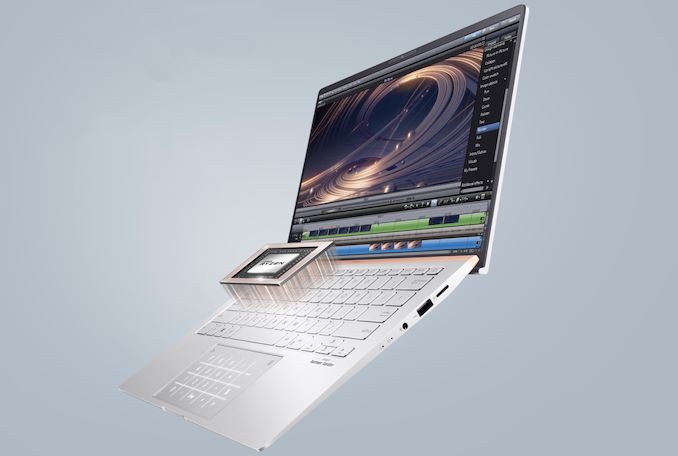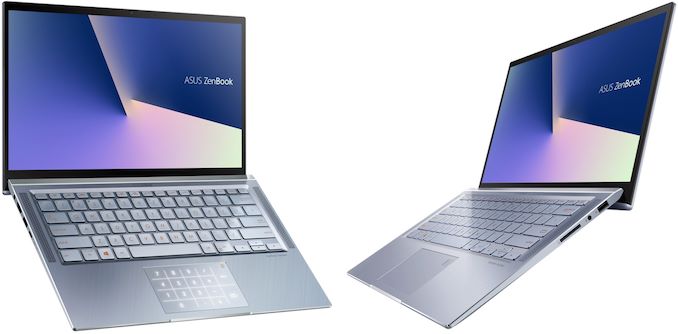ASUS Launches AMD Ryzen-Based ZenBooks: Two Laptops & a Convertible
by Anton Shilov on August 22, 2019 9:00 AM EST- Posted in
- Notebooks
- Asus
- Laptops
- Zenbook
- Ryzen Mobile

ASUS has quietly added three ZenBooks based on AMD’s Ryzen Mobile 3000-series APUs to its lineup. One of the machines is a convertible ZenBook Flip 14, the other two are traditional ZenBook 14 notebooks. All three mobile PCs offer what you come to expect from ZenBook-branded laptops: stylish design, sleek aluminum chassis, high performance components, robust connectivity, and various premium features like Harman Kardon-badged audio or a NumberPad touchpad.
The lineup of ASUS ZenBook notebooks powered by AMD’s 15 Watt Ryzen 7 3700U Mobile or Ryzen 5 3500U Mobile with integrated Radeon Vega graphics currently includes three models: the relatively basic ZenBook 14 UM431DA, the more premium ZenBook 14 UM433DA, and the convertible ZenBook Flip 14 UX462DA.
All the ASUS ZenBook systems based on AMD’s Ryzen Mobile APUs feature a 14-inch InfinityEdge Full-HD display with or without touch support that cover 100% of the sRGB color gamut. While all of the mobile PCs feature thin bezels, the UM433DA seems to feature the thinnest bezels, whereas the UM431DA has the thickest. Meanwhile, the ZenBook Flip 14 UX462DA naturally supports touch, can work with the ASUS Pen (1024 pressure levels, 10-300 grams pen-tip force, Windows Ink, etc.), and features the company’s 360-degree ErgoLift hinge
When it comes to internals of the ZenBook 14 UM431DA, ZenBook 14 UM433DA, and ZenBook Flip 14 UX462DA, they are all powered by AMD’s quad-core Ryzen Mobile 3000-series APUs with integrated Radeon Vega graphics that are paired with 8 to 16 GB of DDR4-2400 memory as well as an SSD ranging from 256 GB to 1 TB (see exact specs in the table below). In a curious move (perhaps for cost-cutting reasons) ASUS decided to use SATA or PCIe 3.0 x2 SSDs on most SKUs; only the most expensive 1 TB SSD features a full PCIe 3.0 x4 interface.
From connectivity standpoint, we have a fairly standard machines with 802.11ac Wi-Fi, Bluetooth, USB Type-A and USB Type-C connectors, an HDMI display output, and a 3.5-mm audio jack. Meanwhile, only the model UM433DA supports USB 3.1 Gen 2 despite the fact that AMD’s mobile platform fully supports the technology.
As far as battery life is concerned, the ZenBook 14 UM431DA and the ZenBook 14 UM433DA are equipped with 47 Wh and 50 Wh batteries rated for up to 12 hours of work on one charge. By contrast, the convertible ZenBook Flip 14 UX462DA comes with a 42 Wh battery rated for 9 hours.
| Specifications of the ASUS ZenBook PCs Based on AMD's Ryzen APUs | ||||
| ZenBook 14 UM431DA |
ZenBook 14 UM433DA |
ZenBook Flip 14 UX462DA |
||
| LCD | Diagonal | 14" NanoEdge | ||
| Resolution | 1920×1080 | |||
| Anti-glare | Yes | ? | ? | |
| Bezels | 6.45-mm bezels | 2.9-mm side bezels 3.3-mm bottom bezel |
4.3-mm bezels | |
| Color Gamut | 100% sRGB | |||
| Touch Support | No | Yes ASUS Pen supported |
||
| Protective Glass | ? | ? | ? | |
| CPU | AMD Ryzen 7 3700U - 4C/8T, 6MB, 2.3/4 GHz - Radeon RX Vega 10 AMD Ryzen 5 3500U - 4C/8T, 6MB, 2.1/3.7 GHz - Radeon Vega 8 |
|||
| Graphics | Radeon RX Vega 10 Radeon Vega 8 |
|||
| RAM (maximum) | 8 or 16 GB DDR4-2400 | 8 or 16 GB DDR4-2400 soldered down |
8, 12, or 16 GB DDR4-2400 soldered down |
|
| Storage | SSD | 256 GB PCIe 3.0 x2 512 GB PCIe 3.0 x2 1 TB PCIe 3.0 x4 |
256 GB SATA 256 GB PCIe 3.0 x2 512 GB PCIe 3.0 x2 |
|
| Card Reader | SD card reader | MicroSD card reader | ||
| Wireless | Wi-Fi | 802.11ac | ||
| Bluetooth | BT 5.0 | BT 4.2 | ||
| USB | 3.1 Gen 2 | - | 1 × Type-A 1 × Type-C |
- |
| 3.0 | 1 × Type-A 1 × Type-C |
- | 1 × Type-A 1 × Type-C |
|
| 2.0 | 1 × Type-A | |||
| Display Output | 1 × HDMI | |||
| Camera | 720p | 720p + IR camera for face authentication | ||
| Fingerprint Sensor | Optional | ? | ? | |
| Other I/O | Microphone, stereo speakers, audio jack | |||
| Other Sensors | ? | ? | Accelerometer, gyroscope, etc. | |
| Battery | 47 Wh 12 hours |
50 Wh 12 hours |
42 Wh 9 hours |
|
| Dimensions | Width | 34.2 cm | 12.7 inches | 31.9 cm | 12.6 inches | 32.2 cm | 12.37 inches |
| Depth | 21.2 cm | 8.34 inches | 20.5 cm | 8.07 inches | 21 cm | 8.27 inches | |
| Thickness | 1.59 cm | 0.62 inches | 1.58 cm | 0.62 inches | 1.89 cm | 0.74 inches | |
| Weight | 1.39 kilograms 3.06 pounds |
1.25 kilograms 2.76 pounds |
1.6 kilograms 3.53 pounds |
|
| Launch Price | ? | ? | ? | |
Wrapping things up, the ZenBook Flip 14 with AMD's processors is available in many countries in different configurations and at various price points. Meanwhile, the ZenBook 14 UM431DA and the ZenBook 14 UM433DA notebooks will be available shortly, with prices to be determined.
Related Reading:
- ASUS Unveils ZenBook Edition 30 Laptop: 13.3-Inch Dual Screen with GPU
- HP Reveals Envy x360 15 Laptops with AMD's Latest Ryzen APUs
- The Lenovo ThinkPad A285 (12.5-Inch) Review: Ryzen Pro Gets Down to Business
- Lenovo Lists ThinkPad E485/E585: AMD’s Ryzen Mobile Land in Business PCs
Source: ASUS (1, 2, 3), NotebookCheck, Liliputing














31 Comments
View All Comments
eek2121 - Friday, August 23, 2019 - link
I mean, it wouldn't be hard to have an on chip 14nm APU. ROME CPUs use 14nm I/O dies. Desktop Zen 2 chips use 12nm.Karmena - Friday, August 23, 2019 - link
Foveros components somewhere should support Infinity Fabric for that to work or AMD chiplets has to have some other interconnect to communicate.twotwotwo - Thursday, August 22, 2019 - link
This is not as simple as it sounds, of course, but both APUs and the semi-custom products for consoles are CPU+GPU. If they managed to share silicon between those two product lines (whether they share *the* die or parts of a multi-chip package), they could stick with their approach of building all their products around a minimal number of pieces, and probably deliver some good perf on the laptop side (though of course it won't have the watts, GDDR RAM, etc.).eek2121 - Thursday, August 22, 2019 - link
AMD is still behind Intel in the laptop world. WAY behind. They seriously need to get with it for both mobile (and APUs) and GPU.I suspect everything is intertwined. AMD COULD release Zen 2 mobile parts, they could have skipped over Zen+ completely, but I suspect the GPU is holding them back. I mean hell, they have 65watt TDP chips stomping the daylights out of Intel currently. I want to see what a 3600 would be TDP wise if it had a base clock of 2.3 GHz.
Teckk - Thursday, August 22, 2019 - link
That SSD and USB rows were a pain to read. Why did they have to make it so confusing..JanW1 - Thursday, August 22, 2019 - link
Does anybody know if these are M.2 SSDs or if they are soldered down as in the Dell XPS?voicequal - Thursday, August 22, 2019 - link
Not sure what XPS model you are talking about. The SSD and RAM are socketed in XPS 15 7590 (2019), not soldered down. https://youtu.be/HY4N08zreXk?t=739JanW1 - Friday, August 23, 2019 - link
Sorry, I should have been more specific: I was talking about the XPS 13 2-in-1.voodoobunny - Thursday, August 22, 2019 - link
Is the RAM in the 431 ("basic") model upgradeable or soldered down? If it's upgradable, what's the max memory it can handle? Upgradability would make it *much* more interesting.Also, it's weird that the "basic" model has BT5.0 but the higher models only have BT 4.2.
voodoobunny - Thursday, August 22, 2019 - link
... upgradability is not looking good - the manual (which you can get to from the links in the article - link -> "Support" -> "Manual & Document") doesn't show any upgrade panels on the bottom view. At the very least, you are going to have to take off the whole bottom to do any upgrades at all.